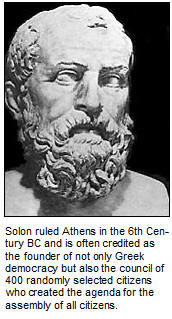This project has two components: 1) state constitutional conventions and 2) electoral reform juries (including redistricting juries). Both constitutional conventions and electoral reform juries are institutional vehicles to address elected officials’ conflict of interest in instituting democratic reform.
State Constitutional Convention Project
This project was launched in January 2010. It seeks to repurpose the state constitutional convention as a vehicle for dealing with democratic reform issues where elected officials have a conflict of interest. A statewide ballot item to convene a state constitutional convention was held in Maryland on November 2, 2010 and received 54.4% of the popular vote. In 2010, four states had constitutional convention referendums on their ballots–a historic high in U.S. history. In 2012, an additional three states will have constitutional convention referendums on their ballots.
The current focus of this project is to encourage Maryland’s Governor and General Assembly to convene the constitutional convention that a majority of Maryland voters voted for on November 2, 2010. For additional details, see Marylanders for a State Constitutional Convention at www.MarylandConCon.org.
Publications
Snider, J.H., Maryland manipulates “majority” vote, Maryland Reporter, November 5, 2012
Snider, J.H., On gambling vote, what is meant by a ‘majority’?, Baltimore Sun, September 23, 2012
Snider, J.H., How to fix Maryland’s D-minus in corruption, Washington Examiner, March 30, 2012.
Snider, J.H., Here’s why Maryland politicos must convene a constitutional convention, Washington Examiner, March 12, 2012.
Snider, J.H., It will take a con-con to untangle Maryland’s gerrymanders, Washington Post, February 12, 2012.
Snider, J.H., State ignores voters on constitutional convention; Majority voted in favor of con-con in 2010, yet it hasn’t been convened, Baltimore Sun, January 19, 2012.
Snider, J.H., Con-con promise comes due for O’Malley , Washington Post, November 14, 2010.
Snider, J.H., and Alan Tarr, A Historic Year for State Con-Cons, Huffington Post, October 12, 2010.
Snider, J.H., The road to term limits in Maryland: A constitutional convention is the state’s best chance for reform, Baltimore Sun, September 22, 2010.
Snider, J.H., Maryland’s Fake Open Government, Washington Post, April 18, 2010.
Snider, J.H., Maryland’s Ballot Surprise, Baltimore Sun, January 8, 2010.
Electoral Reform Jury Project (including citizens assemblies and redistricting juries)
The most prominent political leaders to support citizens assemblies have come out of Canada, New Zealand, the United Kingdom, the Netherlands, and Ireland. iSolon.org has not necessarily supported any of these initiatives, but it has sought to track them and analyze their strengths and weaknesses from the standpoints of democratic theory and real world practicality.
For a compendium and up-to-date list of popular articles on such innovations, subscribe to iSolon.org’s Constitutional Convention and Citizens Assembly Based Democratic Reform Facebook group. The current primary focus of the group is on the yearlong constitutional convention convened in Ireland on December 1, 2012. Two-thirds of the members of the convention were randomly selected from the general citizenry.
All democratic innovations are justifiably treated with great suspicion. With the completion of citizens assemblies in British Columbia (Canada), the Netherlands, and Ontario (Canada), what was a radical idea in 2003–before the first citizens assembly was launched in British Columbia–now seems much more mainstream and attainable.
 iSolon.org views citizens assemblies as a small part of a much larger set of innovations it calls “electoral reform juries.”
iSolon.org views citizens assemblies as a small part of a much larger set of innovations it calls “electoral reform juries.”
One way to categorize electoral reform juries is by their cost. From this perspective, a citizens assembly is a relatively high cost electoral reform jury, and iSolon.org’s proposed “redistricting jury” a relatively low cost electoral reform jury.
For one presentation of this conceptual framework, see J.H. Snider’s If Men Were Angels….: Should the Checks & Balances System Include Electoral Reform Juries?, a working paper presented at the Annual Meeting of the American Political Science Association, September 5, 2009. J.H. Snider’s redistricting jury proposal was featured at a May 4, 2009 conference co-sponsored by iSolon.org and the Hudson Institute.
Much of the recent interest in citizens assembly based democratic reform has been driven by the observation that incumbent lawmakers have an inherent conflict of interest in passing electoral reforms that have a direct bearing on their re-election prospects. The citizens assembly, which is democratically representative of the general population but is chosen by lot rather than election, holds the promise of avoiding this type of conflict of interest
iSolon.org’s Electoral Reform Jury Project analyzes democratic reform areas where elected officials have such a conflict of interest and suggests when and how electoral reform juries could help address the conflict of interest problem.
iSolon.org knows there are many other efforts, including deliberative opinion polls and citizen juries (as well as conventional judicial juries), to use randomly selected bodies of citizens for democratic purposes. But it reserves the term electoral reform jury and its variants to randomly selected bodies with official government powers and with a jurisdiction limited to democratic reform; that is, to areas where elected officials have a direct conflict of interest.
Publications on Redistricting Juries
Maryland’s Ballot Surprise (the web version can be found here), Baltimore Sun, January 8, 2010.
If Men Were Angels….: Should the Checks & Balances System Include Electoral Reform Juries?
(working paper presented at the Representation and Electoral Systems Division’s theme panel, Citizens’ Assemblies and Deliberative Democracy, at the Annual Meeting of the American Political Science Association, Toronto, Canada, September 5, 2009).
The Case for Redistricting Juries: Lessons from British Columbia’s Revolutionary Experiment in Democratic Reform
(working paper presented at a conference cosponsored by the Hudson Institute and iSolon.org on May 4, 2009; the APSA working paper above provides a more up-to-date and rigorous treatment of the same subject).
Praise for iSolon.org’s Citizens Assembly Work
“This is the best source for up to date information and commentary about one of the most important institutional innovations in modern democracy.”
–Dennis Thompson, Professor,
Department of Government, Harvard University
(For more praise, click here.)
Publications on Citizens Assemblies
If Men Were Angels….: Should the Checks & Balances System Include Electoral Reform Juries?
(working paper presented at the Representation and Electoral Systems Division’s theme panel, Citizens’ Assemblies and Deliberative Democracy, at the Annual Meeting of the American Political Science Association, Toronto, Canada, September 5, 2009).
Using Citizens Assemblies to Reform the Process of Democratic Reform
(working paper published by the Harvard Kennedy School’s Shorenstein Center on the Press, Politics and Public Policy, July 14, 2008)
Canada Steps on the World Stage as a Democratic Reformer
(concluding remarks at the Harvard University Canada Program’s conference on democratic deficits and citizens assemblies, May 8-10, 2008, published in the Journal of Public Deliberation, May 2008)
Designing Deliberative Democracy (Cambridge University Press, 2008)
(review of the first major book to be written about citizens assemblies, published in theJournal of Public Deliberation, May 2008)
Citizens Assembly Policy Brief
(May 2007)
Citizens Assembly Policy Paper
(published in the National Civic Review, January 2006)
Citizens Assembly Fact Sheet
(British Columbia, Netherlands, Ontario)
Original Citizens Assembly Blog
(replaced by this website and the Citizens Assembly News Digest in January 2008)
Archived
Citizens Assembly Digest & Facebook Group
During the second half of the 2000s, iSolon.org’s Electoral Reform Project reported on citizens assembly developments throughout the world. Those who wanted news of citizens assembly developments could subscribe to the free Citizens Assembly News Digest,which was emailed to democratic reform activists and scholars in more than a dozen countries. This Digest was generally sent out several times a year.
Reporting on Citizens Assembly developments was a joint project with iSolon.org’s readers. iSolon.org carefully monitored the print press and blogosphere for reports on citizen assemblies, but also got much of its most valuable information from its readers.
(The Citizens Assembly News Digest was superceded by the Facebook group below).
Citizens Assembly Facebook Group
(provides a chronological listing of citizens’ assembly events and a wall to post citizens assembly information)
To Subscribe or Unsubscribe to the Citizens Assembly News Digest
Click here to subscribe to the Citizens Assembly News Digest
To unsubscribe from the Citizens Assembly News Digest, please send an
email to CitizensAssembly@iSolon.org with the word “unsubscribe” in the
subject line.

Recent Comments